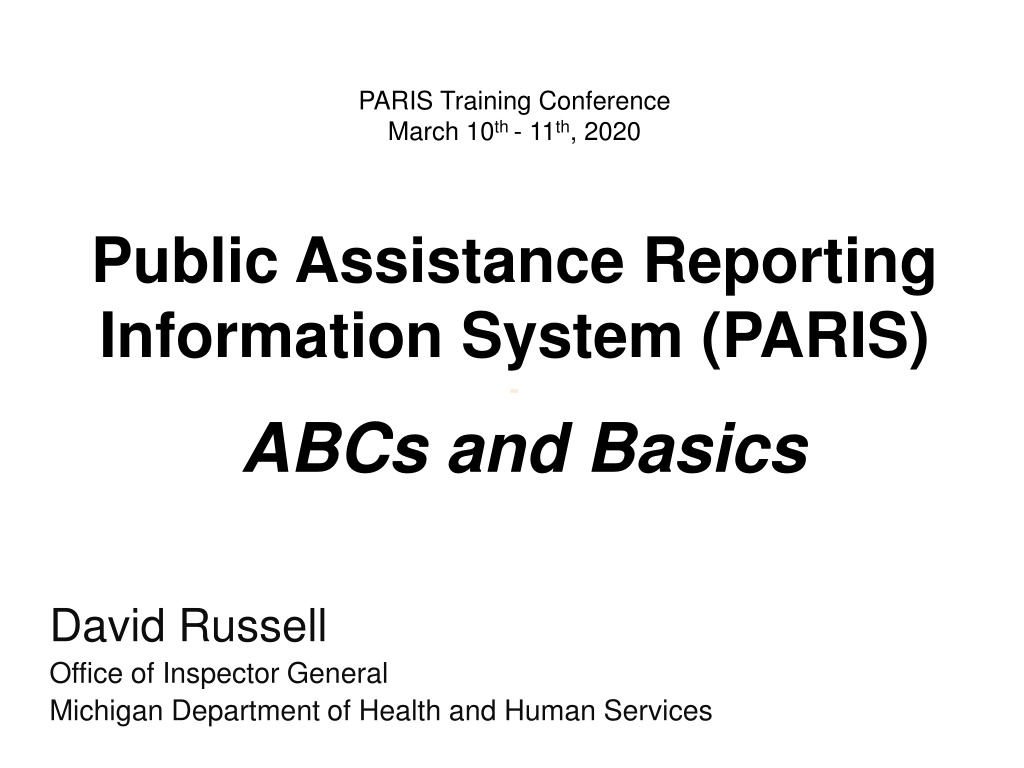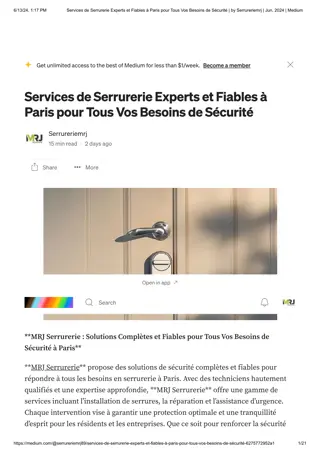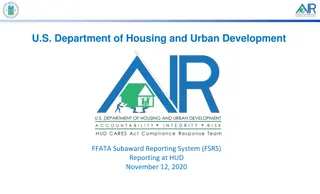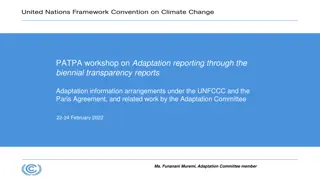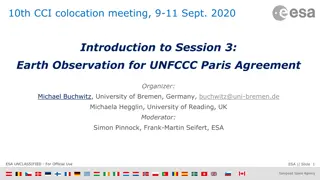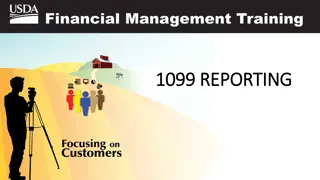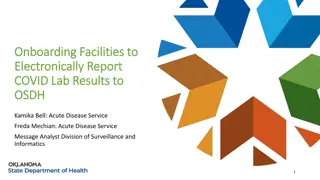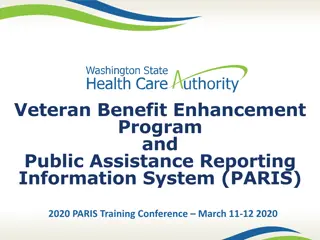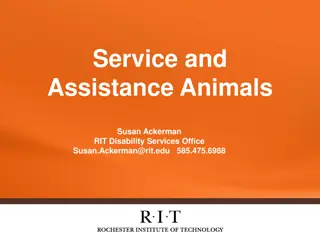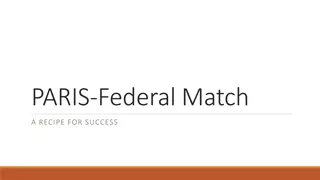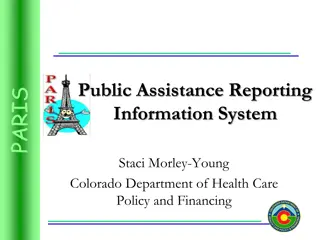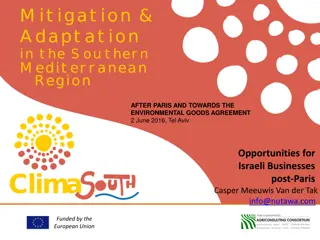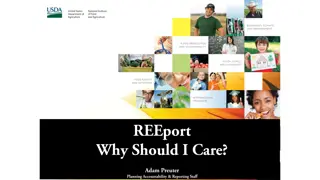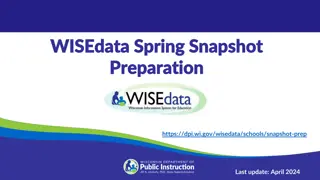Understanding PARIS: Public Assistance Reporting Information System
PARIS is a system that states must participate in for Medicaid-Qualifying Individual Program Supplemental Funding. It involves data matching, processing, and return of matched records for continued eligibility and fraud prevention. States have flexibility in deciding aspects of the process. PARIS is not a comprehensive list of all veterans or a national welfare database. Quarterly matches provide active state listings, and input files contain state information. Visit www.acf.hhs.gov for standardized file layouts.
Download Presentation

Please find below an Image/Link to download the presentation.
The content on the website is provided AS IS for your information and personal use only. It may not be sold, licensed, or shared on other websites without obtaining consent from the author. Download presentation by click this link. If you encounter any issues during the download, it is possible that the publisher has removed the file from their server.
E N D
Presentation Transcript
PARIS Training Conference March 10th - 11th, 2020 Public Assistance Reporting Information System (PARIS) - ABCs and Basics David Russell Office of Inspector General Michigan Department of Health and Human Services
Q: Are states required to participate in PARIS? A: YES, for Medicaid Qualifying Individual (QI) Program Supplemental Funding Act of 2008 42 CFR 435.945 (d) All State eligibility determination systems must conduct data matching through [PARIS] No other programs are required to be run through PARIS, but cost benefits are there.
In Summary Step 1 States send records to DMDC Step 2 DMDC processes records Matches Step 3 DMDC returns only matched records to States For both State A and State B State A and FED/Veteran info added on Step 4 States process matched info for continued eligibility, potential fraud, or assist Veterans in their states
PARIS Process: Flexibility States decide: The SSNs to submit The quarters in which to participate The programs to match against Must include Medicaid Which matches to work and when Interstate in August Best method for handling the return files Automated via Eligibility System Eligibility Team Fraud Control Unit ???
What PARIS isnt Not a list of all Veterans The returned VA file only identifies veterans (or spouse, or survivor) receiving VA benefits, or who may be eligible for VA benefits, based on the SSNs that were submitted by a State/SPAA Not a National Welfare Database The returned records are only those who matched people from your state
A Quarterly Match is: FALSE! TRUE! a list of people active with the state during the last quarter. a list of people active with the state as of the quarterly match date.
The Input File Input file contains state information for any and all of the three matches PARIS standardized file layout document can be found on the PARIS website The input file link: www.acf.hhs.gov/programs/paris/sys_info/index.html#fileformat
Benefits of a Prepped File? Improves the data returned to you after being matched by DMDC Improves the data you are sharing with your fellow Member States/SPAAs on the Interstate match Format must be followed, or errors will occur upon return, and with matches provided to other states
Dates whats the big deal? Many States use the program start and end dates as a filter Enter a start date and an end date for each program submitted
The Quarterly File Date (elements 49 -54) Follow the format: YYYYMM stands for the year and month of the quarterly match: E.g., May 2020 s file date is to be 202005 States that don t follow the format may have their records ignored by matching states Do not submit old data! This include prior quarter(s) data Creates false hits & reduces efficiency
Start/End Dates: The right way(s) Option #1: Use the most recent program start date or the program start date for the current certification period. Use the end date of the current certification period Option #2: Use the most recent program start date or the program start date of the current certification (same as #1). For the end date use 99999999 or 99991231 to indicate the program is still open
Start/End Dates: Errors found Individuals [records] with: End dates, but no Start dates for programs marked as Y * No dates for programs marked as Y * Recent Start dates, no End dates, but marked as N for program Start and End dates prior to match quarter, but marked Y for program * Acknowledging these fields are optional.
The Importance of 198 Position 198 on the input file is the SSN Verification Indicator Please submit verified SSNs on your input file SSA s Verification Codes are OK to use If left blank, some States filter these out as unverified
The importance of GOOD SSNs The first SSN received by DMDC (from each State) is kept, all others with that # are dropped The bad SSN, if received first will take over the spot for the state Bad SSN s cause extra work for both states that match it
What goes in the State Optional Data: positions 57-116? Whatever you need on your own returned records from all three matches Some States use this to differentiate between agencies (for example the TANF/SNAP agency and the Medicaid agency if separate) Many states use this for internal system identifiers
Mandatory / Optional fields Complete ALL mandatory fields DMDC needs them to properly process your file for each of the three matches you want to participate in Other States need them to properly process Interstate matches with your State Contact information is especially important
Ys and Ns: Match Request Code To participate, at least one data match request field must be entered as Y in positions: 299 for VA file 300 for Interstate 301 for FED file Only mark Y if you have a signed MOA on file at ACF for the intended match DMDC requirement: Y = Yes; All other entry (or Null) = No If not Yes, no file is returned
Ys and Ns If a Y/N field is mandatory, we expect to see one or the other (a character means the question was answered). Insert Y or null for each program (e.g., FS, MA, CC, etc.) Submit record only if recipient is open for at least one program. Exception is Child Care Indicator in position 321: Use P for Parent, C for Child and R for Provider.
Data Quality and Freshness PARIS data is only as good as the states that contribute. Submit only CURRENT and ACTIVE recipient data. Matched data from the PARIS Interstate, Federal and Veterans files are less than one month old when returned to states. If system glitches happen and affect data submission quality, states need to notify the PARIS Project Officer.
DMDC: The goods DMDC strives to return all data by the 10th of the month following the match. Therefore, if a member State is late with its data submission, that delay impacts everyone. DMDC can provide limited testing assistance for new file transmission methods via new state systems
Once the files are returned
State Contact Info Note that there are two places in the Interstate file for contact information: Main contact fields MA Contact Info (for states with multiple departments handling Medicaid and public assistance.
Share Contact Info with Staff States need to distribute ALL received contact information to staff: Phone (& extension), Email, and/or Fax Provides for best method to contact other state. Avoids calls to PARIS Admin. Staff posted on PARIS website. Includes optional MA Contact Person information in position 446-495
Interstate Match: The Most Common Question Which state pursues the overpayment and/or program disqualification? MA recoupment from beneficiaries supported by: 42 CFR 431.230(b)
Interstate Match: Which State has the Overpayment? It depends: If the recipient is required to report when they move (out of state) Seek repayment When a client applies for benefits in a state and fails to report that they were currently participating in the program in another state Seek repayment (non-Medicaid answer) If the recipient was required to report the move to the state they moved from and did not, that state may also have a potential overpayment and IPV. Communicate with other state
Recap: What to do with the Matches Interstate: Residency Duplicate assistance Federal: Unreported earned or unearned income Residency Misreported medical insurance Veterans: Outreach Over/under reported unearned income Misreported medical insurance
PARIS BOD is comprised of a key technical support representative from ACF and ten elected state technical and program representatives. The BOD provides support to SPAAs by disseminating information, processes, techniques and activities, which maximize the technical abilities of states systems and staff performing PARIS related activities.
ACFs PARIS Project Officer Joshua Williams, Project Officer Public Assistance Reporting Information System Division of Data and Improvement Office of Planning, Research & Evaluation Administration for Children and Families U.S. Department of Health and Human Services Paris Contact Email: PARIS@acf.hhs.gov or HHS- PARIS@hhs.gov PARIS Website: www.acf.hhs.gov/paris
